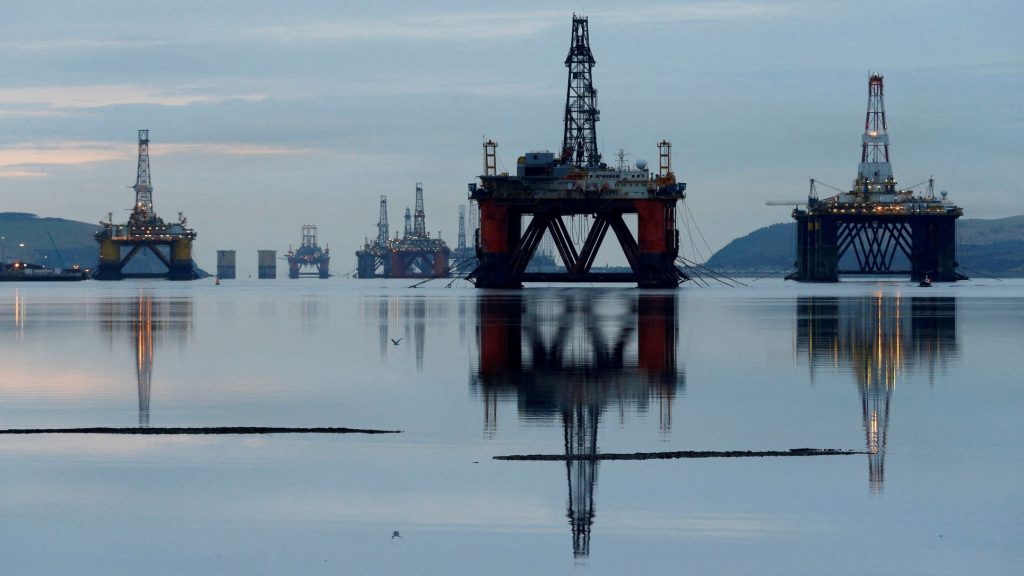UK Energy Plan Puts Investors, Banks In Tough Net-Zero Spot

Britain’s move to green-light dozens of new oil and gas fields will leave investors and banks with a tough PR job as Britain struggles to shore up its energy security whilst sticking to its climate commitments.
Starting new oil and gas projects runs counter to the world’s shift away from fossil fuels in the fight against global warming and a commitment at last November’s U.N. climate talks to phase down their use.
Yet runaway inflation amid conflict in Ukraine has forced the hand of new British prime minister Liz Truss as Russian President Putin seeks to use energy as a weapon this winter.
Britain will launch a new round of oil and gas licensing next week with more than 100 licenses issued, part of a wider package of measures to tackle the energy crisis announced by Truss on Thursday.
And Britain’s not alone in reassessing its energy strategy. Germany, for example, has been forced to turn back to even dirtier thermal coal to help fuel its power plants and keep the lights on, hampering short-term efforts to rein in climate-damaging carbon emissions.
But for energy companies and the investors, bankers and insurers that finance them, new investment in fossil fuels also presents a challenge given many have made their own pledges to reach net-zero emissions by mid-century.
“This will absolutely hinder companies’ … ability to hit their climate targets,” said Pietro Bertazzi, global director of policy engagement and external affairs at non-profit environmental disclosure platform CDP.
“In 2021 the IEA [International Energy Agency] advised that there can be no new investments in oil, gas and coal if we are to have any chance of meeting our global goal of limiting global warming to 1.5C.”
The plans are also likely to make discussions at the next round of climate talks in Egypt in November even harder.
A spokesperson for the Net Zero Asset Owners Alliance (NZAOA), a group including insurers and pension schemes with more than $10 trillion in assets aiming to push for lower emissions, said policies must be aligned with the global climate goal.
“If investments and public policies misalign with that, then that’s in conflict with the Alliance’s vision and mission,” the NZAOA spokesperson said.
“Crises, like the current energy market upheavals, may make exceptions necessary to ensure energy security. However, none of these exceptions should make us deviate from the mid and long-term targets that facilitate the transition towards a net-zero economy.”
Some senior financial services executives spoken to by Reuters also see some scope for flexibility, provided longer-term targets are met.
For Tom Pearce, chief executive of insurer Rothesay, the company’s pledge to cut portfolio emissions 20% by 2025 would remain a priority, but “to the extent businesses have a good forward plan, we would consider them”.
Others say the chances of meeting net-zero targets on schedule were so small, reducing western Europe’s dependence on Russian energy through greater support of coal-fired energy production, was the highest priority for the security of the region and, ultimately, world peace.
CREDIBILITY GAP
Britain’s plans to invest in oil and gas are part of a bid to become a net energy exporter by 2040.
Anna Moss, senior sustainability analyst at asset manager Abrdn, however, said the country’s energy plan would “widen the credibility gap between the UK’s climate pledges and its climate action, as well as impacting on the credibility of any existing transition strategies that participating companies already have in place.”
While there was a clear need to ensure energy security, she said the new oil and gas licences would not start delivering for at least a decade and there were more cost-effective ways to improve security without sacrificing the climate, such as renewables.
As part of the Net Zero Asset Managers initiative, Abrdn has pledged to halve the carbon intensity of its portfolio, a measure of emissions linked to the value of its investments, by 2030.
“All the investors and banks that have… committed to halve their emissions by 2030, should seriously ask themselves if helping finance these projects, directly or indirectly, is in line with their commitment,” said Hortense Bioy, director of sustainability research at fund industry tracker Morningstar.
“Some will come to the conclusion that it’s not and may stop supporting the companies that will bid for the licenses.”
(Reporting by Simon Jessop, Carolyn Cohn and Sinead Cruise; Editing by Susan Fenton)




